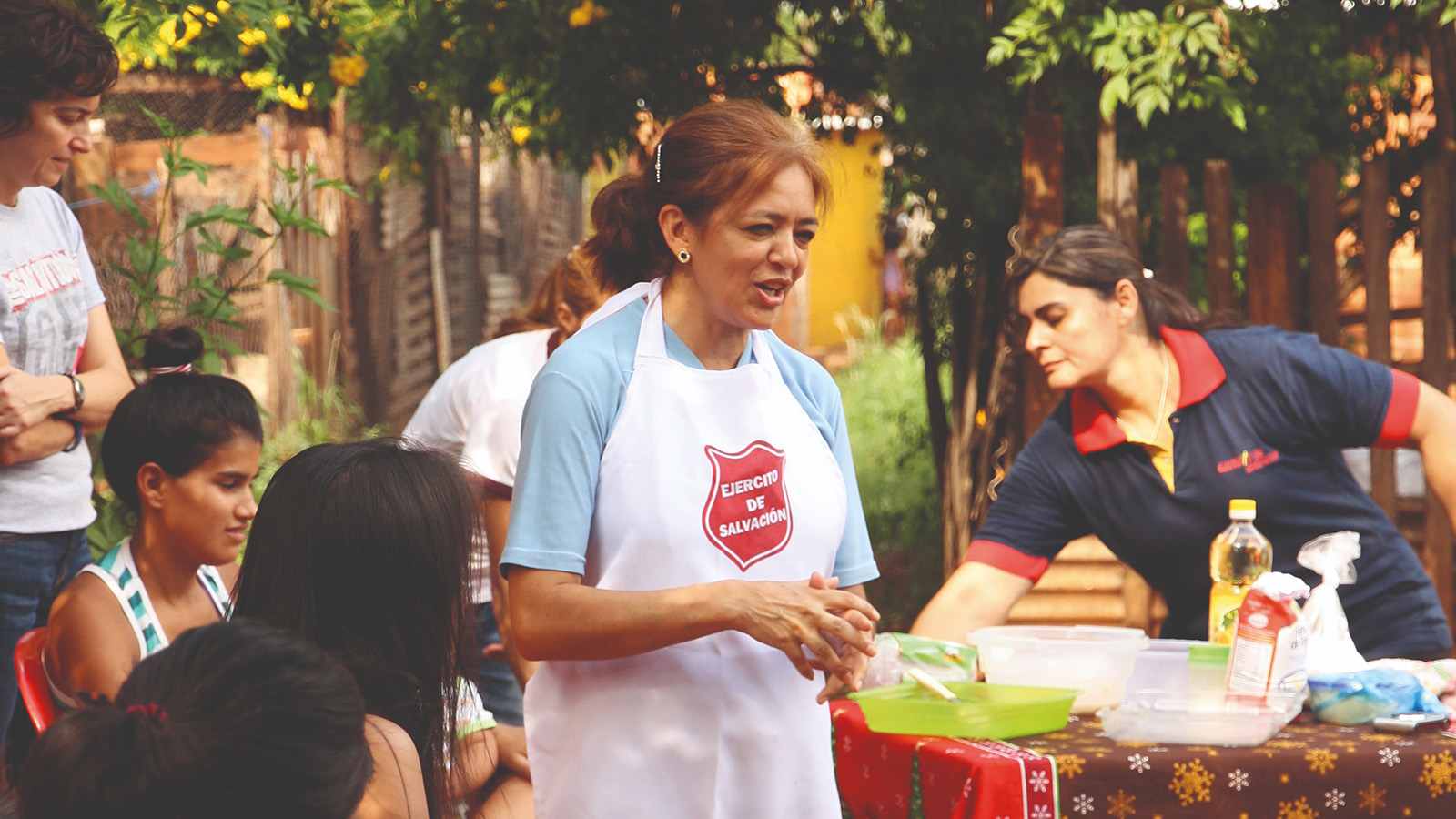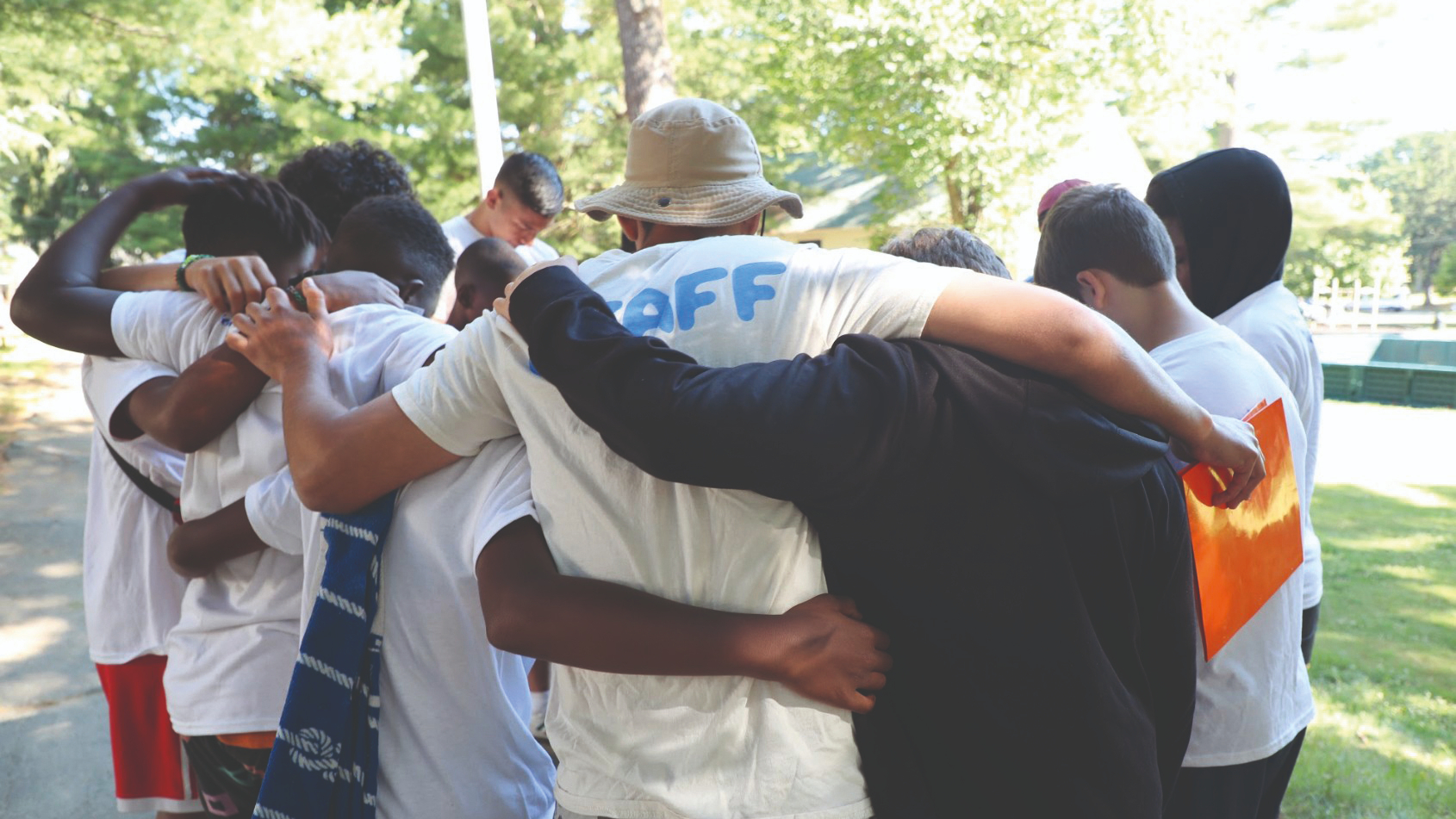Spotlight on Americas and Caribbean Zone
The Americas and Caribbean Zone encompasses, as the name suggests, the continents of North America and South America, in addition to a few outlying regions such as Guam and the Marshall Islands.
The gospel is preached in over 30 languages across the zone, which comprises 11 territories and the USA National Headquarters.
The Americas and Caribbean Zone is vast, with needs as varied as the people. For a closer glimpse at just a thread of our tapestry, this exhibition, first shown at Gallery 101 in July 2023, showcases work happening in four locations: Mexico, USA Southern, USA Eastern and Paraguay.
‘The Americas and Caribbean zonal office represents the General to the territories of the zone, and in turn advocates for the territories on their behalf to International Headquarters. At our core, we are a resource, existing to prayerfully support, facilitate and champion the advancement of the mission of The Salvation Army in the zone.’
Commissioner Edward Hill, International Secretary for the Americas and Caribbean Zone
Boundary Lines
Mexico and USA Southern Territories
A border is an inscrutable thing. To some, it symbolises protection from external forces, to others it can feel like a cage. For many, a border means new horizons and opportunities, to others, a military blockade.
Weaving its way, for the most part, along the banks of the Rio Grande, the Mexico-US border is 1,954 miles of opportunity and danger. In 2022, nearly 2 million people attempted to cross this border – a journey which can be gruelling, dangerous and even claim lives.
The Salvation Army has the burden and the honour of existing on both sides of this border – to the north, the state of Texas sits within our USA Southern Territory; to the south, a literal stone’s throw away, the states of Chihuahua and Coahuila are part of our Mexico Territory. Both are responding to the needs of what is fast becoming a humanitarian crisis. But what does it look like to serve people, as Jesus would, on either side of a human-drawn line?
The Kingdom of God’s love has no borders, requires no visa and there is no fear of deportation. With this in their hearts, the work of The Salvation Army in Mexico and USA Southern seeks to meet people where they are, as they are.

A field kitchen along with shower unit, deployed around the USA/Mexico border
In the Texas Division, led by its Emergency Disaster Section, corps officers (ministers) and other trained responders provide a number of services including delivering food parcels and coats to survive the winter months, providing legal assistance, teaching and resourcing about the risks of human trafficking and leading children’s play programmes. This work has served thousands of people across 2022 and continues to serve them in 2023, as the migration crisis at the US-Mexico border continues.
South of the divide, the Mexico Territory has many projects and programmes in Tijuana and Ciudad Juarez which cater to those who have attempted to cross, are waiting to cross or those who have experienced deportation. There are multiple men’s and women’s shelters for those at risk of, or those fleeing from, human trafficking scenarios associated with making the crossing into the US. These shelters provide temporary housing, rehabilitation and psychosocial support for their beneficiaries. They provide trauma-informed services – meaning that each step of the response is rooted in respect for the pain and suffering experienced by those involved.
In both countries, the local corps (churches) work tirelessly to provide spiritual support and loving hospitality to those who have experienced the trauma of migration. Psalm 16:6 says: ‘The boundary lines for me have fallen in pleasant places. Surely I have a delightful inheritance.’ The boundary lines of the world often fall in unpleasant places, creating division and danger. The millions of displaced people across the globe can attest to this, but the parameters of God’s love have fallen in such a way that they include all and exclude none.
The work being done by The Salvation Army Mexico and USA Southern is a prime example of borderless love and service without discrimination.
‘It is such a joy to see so much of the Army’s core mission exemplified across our zone. From spiritual wellness, education and children’s programmes to anti-human trafficking training, disaster relief and women’s ministries – the Lord is at work.’
Commissioner Shelley Hill, Zonal Secretary for Women’s Ministries for the Americas and Caribbean Zone
Community Growth
South America East Territory
The South America East Territory comprises the countries of Argentina, Paraguay and Uruguay. Across all three countries, the work of The Salvation Army is felt in a profound way. The following two projects take place in Paraguay and focus on community health and children’s education.
CLINICA TEKOKATU
The Tekokatu Clinic maintains a close relationship with the local community through programmes that are offered both inside the centre and out in the community. They are a point of reference for many families in the area who are looking for information and orientation regarding social, economic, legal, spiritual and educational issues. The primary healthcare services offered in the clinic are distinguished by the quality of attention and the professionalism of the medical team.
Their community health work is unique. They hold health fairs, educational talks and nutritional workshops through which good habits are promoted for the prevention of chronic diseases.
Their programmes are open to anyone in the community, but in general the majority of the participants are women, including mothers of all ages. The talks and workshops that the clinic offers provide education on physical health, healthy relationships and healthy self-esteem. They aim to positively influence the lives of women and to help them change, if necessary, some of their daily habits.

A nutritional workshop in the community of Cable Guy
‘When we can influence change, the whole family is positively affected and, as a consequence, the community,’ says Development Officer Claudia Franchetti, who was instrumental in instigating and implementing this project, which has seen nearly 5,000 patients in-clinic and more than 1,000 patients in the community programmes across 2022.
CURIOUS AND BRAVE
This project is special because it not only helps children with their homework, but also seeks to bring out the best in each child, including intellectual capacities, creative skills, critical thinking and assertive communication, through exciting and socio-constructivist activities. The programme also aims to strengthen families by focusing on good treatment, respect and altruism.
The participation of families is fundamental as The Salvation Army in Paraguay seeks to empower parents to take responsibility for the education of their children. This requires families, schools and the community to work together towards a mutual goal. To support the success of each child, they all must commit to do their part. It also means taking advantage of the resources that the project provides for parents that can help children succeed and be prepared to lead happy and productive lives.
‘We are starting to make “noise”, as we solicit a response from parents, grandparents, uncles and aunts. We encourage them to have an open mind and to say what they think, as well as to transmit respect, responsibility, teamwork and affection for their children. In this process there is still a long way to go for the transformation to take root, but what has been achieved so far is important,’ says Claudia.
- 73 children
- 160 total, including children and their parents (approximately)
- 1 director
- 6 officers in each centre
- 6 teachers
- 4 members of the technical team (social workers, psychopedagogy coordinator and general coordinator)
‘From schools in Mexico and Central America to hospitals in South America, our call to serve suffering humanity extends throughout the Americas and Caribbean Zone. Officers, soldiers and friends of The Salvation Army work tirelessly to provide for the physical, emotional and spiritual needs of those in their communities.’
Captain Sergio Garcia, Under Secretary (Latin America and the Caribbean) for the Americas and Caribbean Zone
A second home
USA Eastern Territory
Jen Forster, camp director at Salvation Army Camp Wonderland in Sharon, Massachusetts, talks about growing up as a twin, sharing her love of reading with campers and how she stays connected to camp counselors when summer is over.
A lot of people in The Salvation Army have been involved in several of its camps, but I’ve experienced only Camp Wonderland. I grew up in a little town in Massachusetts called Athol and came to Wonderland at six years of age. It gave my siblings and me our first experience outside our hometown. I met kids my age who didn’t look like me and had different cultural backgrounds.
When I turned 14, I started coming to Wonderland to work in the summer. Today, I’m the director of the camp, and I’ve also done just about every job there is to do here. That’s helpful when I train someone for the first time, and I can say that I was there myself. Wonderland has been a second home to me, my family and my own children.
My twin sister Jodi is my closest confidant. Being a twin really influenced my childhood in a way that I didn’t notice until I had children of my own. Because I’ve always had my sister to interact with, making friends never felt difficult or full of the pressure that many kids feel. Though Jodi and I had lots of friends, we were blessed to know that our best friend would always be waiting at home, and nothing would change that.

Children at Camp Wonderland
Reading has been a crucial part of raising my children. When I was a child, no one read to me. But when I had children, I made sure to read to them and with them often, even as they grew older. I wanted to bring that reading experience to Wonderland. So, Elisabeth Evans, an 8th grade teacher who is also our programme director, wrote a grant to bring more books into camp. Now, libraries are in each of our cabins, so our campers have access to books during any down time. Every night after devotions, we encourage counselors to read aloud to kids as they go to sleep. We want to replicate that experience for our campers so they will realise the power of reading.
It’s important that The Salvation Army stays connected to young adults. That’s why working as a college ministries director means so much to me. I visit the camp counselors at their college, go out and eat with them, give them my full attention and build a connection that goes beyond the work they do for Camp Wonderland. I love seeing that part of their lives as I get to know who they are when summer is over. They’re making an impact on their world. When they become adults, some come back to volunteer. I’ve been here long enough to see kids who came as campers, were staff members and now send their own children to Wonderland. We’re still here to welcome them home.
When working with children, every summer and every day is completely different. But Jesus Christ is the same, yesterday, today and forever (Hebrews 13:8). He is consistent, and he never changes. When there is an issue in camp that weighs on my heart, I still say that I can’t wait to see how it will all work out. We know that this ministry is important to him, and he will provide for it.
Interview by Hugo Bravo from saconnects volume 8, number 3, 2022
